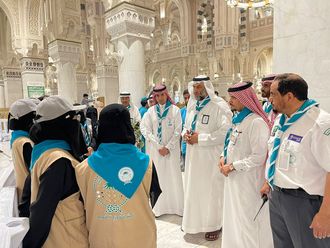Manama: Two courts in Saudi Arabia have separately upheld the death sentence for 14 Saudis members of a terror cell and for 15 Saudis convicted of espionage for Iran.
The Supreme Court endorsed the death sentences for 14 of the 23 individuals on a terror list announced by the interior ministry, more commonly known as Al Awamiya Cell, in reference to a town in Qatif district in the Eastern Province.
The death sentences were pronounced by the Specialist Criminal Court and at later stage approved by the Court of Appeals, Saudi daily Okaz reported on Thursday.
The ruling by the Supreme Court is final and will be carried out after it is approved by the king.
The death row prisoners, including a security man, were found guilty of carrying out more than 50 armed attacks in several areas in the Eastern Province.
According to the charges, they targeted two police stations in Al Awamiya and Qatif, a prison in Qatif, police check-points and 20 police patrols. Several policemen were killed or injured in the attacks, the report said.
They also carried out more than 40 attacks on commercial shops and private residences and ambushed a cash-carrying van, wounding and stabbing guards and fleeing with 1.2 million Saudi Riyals.
They were also charged with selling and dealing in drugs in Al Awamiya, particularly Captagon and hashish, and with illegally collecting cash and donations to fund their terrorist activities.
The courts sentenced nine other members of Al Awamiya Cell to prison terms ranging between three and 15 years and to various fines. They were also barred from leaving the country following their terms. One member was acquitted of all the charges.
In another case, the Specialist Penal Appeals Court approved the verdicts pronounced by the Specialist Criminal Court in the case of espionage for Iran.
The court ruled the death sentence for 15 Saudi nationals, prison sentences ranging between six months and 25 years for 14 Saudis and one Iranian and the acquittal of two suspects, one Saudi and one Afghani.
The case will go through legal procedures and will be referred to the Supreme Court for a last decision.
In June 2016, Saudi Arabia announced the arrest of 32 people, suspected of links with the Iranian intelligence.
Following investigations, they were charged with the formation of a spy cell, which liaised and collaborated with elements of the Iranian intelligence to provide secret and sensitive information related to the military and that affects the national security, the territorial unity and integrity of Saudi Arabia and its armed forces.
The suspects were also accused of meeting Iran’s Supreme leader Ali Khamenei and coordinating with agents from the Iranian intelligence.
Other charges included attempts to carry out acts of sabotage against economic interests and vital installations in Saudi Arabia, to undermine social peace and public order, to spread chaos, to incite sectarian strife, and to carry out hostile acts against the kingdom.
The suspects also faced accusations of high treason of their country and king, and of attempting to recruit people working in state agencies to commit acts of espionage for the Iranian intelligence services.
According to the charges, most suspects had travelled to Iran and Lebanon where they were trained on espionage techniques, including drafting coded messages.
Some of the suspects had hacked into computers to obtain sensitive information related to the internal and external security and to the national economy of Saudi Arabia.
Others charges included supporting riots and demonstrations in Qatif, possessing weapons, forging documents and accepting bribes.
In December, the Criminal Court issued its verdict.
According to Okaz, all court trials in cases related to national security, including, terrorism and espionage, are open to the public, the local media, and representatives of diplomatic missions and human rights groups.











